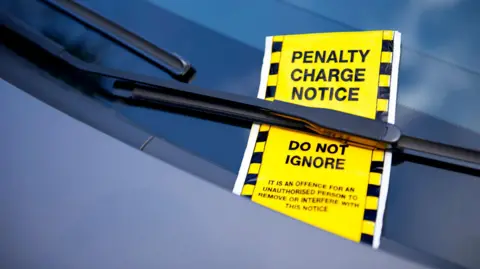Parking fines set to rise across London
 Getty Images
Getty ImagesParking penalties across London look set to increase by £30 after a proposal was signed off by mayor Sir Sadiq Khan.
It follows a request by London Councils, the body that represents the capital's local authorities, including the City of London Corporation. London Councils said the change would act as a deterrent to "anti-social and obstructive parking".
Higher-level charges in Band A areas would increase from £130 to £160, and from £110 to £140 in Band B areas.
Matt Jaffa, from the Federation of Small Businesses (FSB), criticised the move, arguing that "small firms can ill afford these extra costs".
London's boroughs differentiate penalties based on the severity of the offence, with higher-level charges for more serious transgressions, such as obstructing roads, and lower-level penalties for less severe matters such as overstaying in parking bays, according to London Councils.
These penalties also vary depending on the location. Band A typically covers central London, while Band B applies to outer areas.
The revised penalty charge notice (PCN) levels would be:
- £160 for Band A higher-level offences - this charge is also the set-level penalty for bus-lane and moving-traffic contraventions
- £110 for Band A lower level
- £140 for Band B higher level
- £90 for Band B lower level
The 50% discount in place already would remain for those who pay their PCNs within 14 days, London Councils said.
In a consultation on the proposals, 50% of the respondents complained about "dangerous and inconsiderate parking", with pavement parking highlighted as the biggest issue.
However, almost half of the 1,600 respondents did not want PCNs to be increased, with the main reason cited being the increased financial burden.
In its request to the mayor to increase the fines, London Councils said the cost of enforcement had "increased significantly".
'Overzealous'
Caroline Russell, Green Party member of the London Assembly's transport committee, said the rise would bring the capital's boroughs' fines in line with Transport for London's (TfL) roads.
She said: "It's all about making sure that people don't park in a way that introduces danger onto our roads.
"I thought this was a sensible piece of tidying up. Anyone who parks legally won't get a fine, and they do want to make sure the fine acts as a deterrent.
"The idea that it's revenue-raising is not really going to fly."
However, the FSB's Mr Jaffa said: "We are very concerned about the 25%+ increase during a cost-of-doing-business crisis.
"Overzealous fines are on the rise and small firms can ill afford these extra costs."
A London Councils spokesperson said the increased PCN charges are needed "at an appropriate level so that they are effective as deterrents".
"Through using PCNs to manage parking and traffic, boroughs can reduce congestion and incentivise road users to drive and park safely, protect access, crossing and junctions, and increase active travel such as walking and cycling," the spokesperson said.
They added that any net revenue raised by PCNs goes toward transport schemes, such as the Freedom Pass.
He added that small businesses were "crying out for a carrot in terms of extending congestion charge exemptions for business electric van users".
The proposed increases will now go to Transport Secretary Heidi Alexander, who will have a month to raise any objections. The Department for Transport said it could not comment at this stage.
A spokesperson for the Mayor of London, said: "The Mayor considered evidence provided by London councils, acting on behalf of all London boroughs, who believe the increase is needed to ensure adequate deterrence for noncompliance, given the considerable increase in PCNs.
"The number of people receiving PCNs has increased by 50% over the last 12 years. In that time, enforcement costs have risen, and boroughs are concerned the penalty charge regime isn't sufficiently recovering costs.
"PCNs are a vital way we keep London moving by deterring inconsiderate driving and protecting road space such as disabled bays."
Listen to the best of BBC Radio London on Sounds and follow BBC London on Facebook, X and Instagram. Send your story ideas to [email protected]
